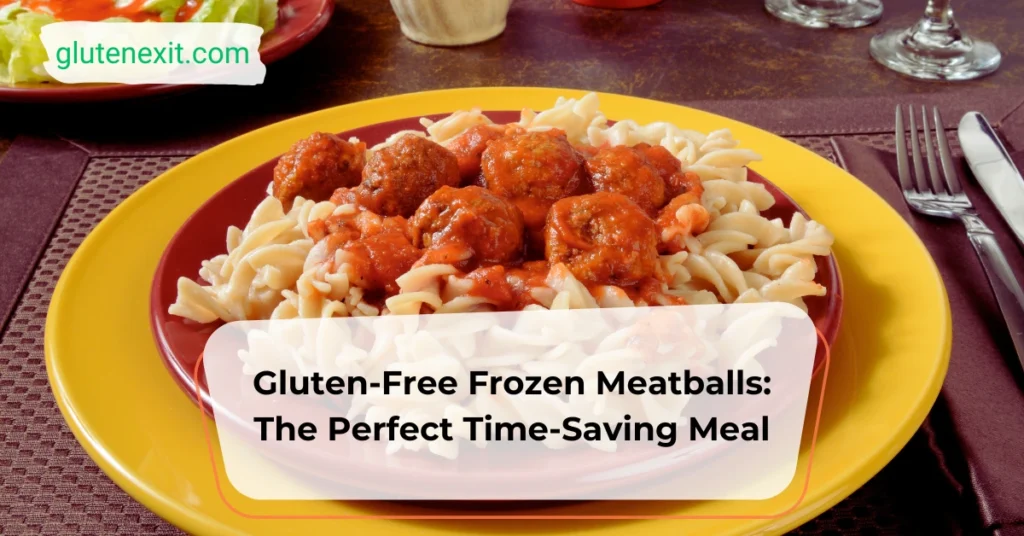Let’s be honest—some days, life moves so fast that cooking a complete meal feels impossible. Between work, errands, and family, I hardly have time to think, let alone cook a homemade meal. That’s why I’m obsessed with gluten-free frozen meatballs. Trust me, they’ve been a game-changer in my kitchen, and if you haven’t tried them yet, you’re missing out!
I still remember the night I first discovered them. I had gotten home after a long day, my kids were starving, and I needed something fast but still nutritious. First, I took a bag of Trader Joe’s gluten-free meatballs from the freezer. After that, I warmed them up, and finally, dinner was ready in minutes. The best part? My kids devoured them without even realizing they were gluten-free. Total win!
But what makes these meatballs so good? Let’s break it down.
Table of Contents
What Exactly Are Gluten-Free Frozen Meatballs?
In simple terms, these are pre-cooked, frozen meatballs made without wheat-based ingredients. They replace traditional breadcrumbs with gluten-free options like almond flour or rice flour. Whether you avoid gluten for health reasons or want to eat less, these meatballs are a quick and easy meal.
And the variety? Amazing. You can choose from beef, turkey, chicken, or even plant-based options. The choice is yours. So relax, there’s something for everyone.
Why Go Gluten-Free?
I used to think gluten-free eating was another fad. But after learning about celiac disease, I realized it’s more than a trend. Some of my friends have gluten intolerance, and I’ve seen how difficult it can be for them. For many people, avoiding gluten isn’t a choice—it’s a necessity.
Even if you don’t have celiac disease, cutting back on gluten can make a big difference. I’ve noticed that eating gluten-free makes me feel way less bloated and sluggish. So, finding convenient, tasty options—like these meatballs—was a total win for me.
Why I Always Keep Gluten-Free Frozen Meatballs in My Freezer
No doubt, these are a staple in my kitchen for so many reasons:
Packed with Protein: They keep me full and energized without much effort.
Super Convenient: On nights when I have zero time to cook, I can pop them in the oven or pan-fry them—no mess, no stress.
Kid-Approved: My kids love them, and they have no idea they’re gluten-free. That’s a parenting win in my book.
What’s Inside These Meatballs?
Each brand uses different ingredients. But most gluten-free frozen meatballs have a few things in common. They are both tasty and safe for people who avoid gluten.
Good Protein Choices: You can find them in beef, turkey, chicken, or even plant-based options. There’s something for everyone!
Gluten-Free Binders: Many other options exist for replacing regular breadcrumbs. They use almond flour, rice flour, or gluten-free oats as gluten-free binders.
Bold Flavors: These aren’t bland! You’ll find seasonings like garlic, parsley, and black pepper for extra flavor.
My Go-To Gluten-Free Meatball Brands
Over time, I’ve tried a bunch of different brands, and these are the ones I keep coming back to:
Trader Joe’s Gluten-Free Italian Meatballs
Pros: These are packed with rich Italian seasoning and high-quality beef. My family loves them!
Cons: They are only available at Trader Joe’s and don’t offer many flavors.
Cooked Perfect Gluten-Free Meatballs
Pros: It comes in different flavors, like homestyle and turkey so that I can mix things up.
Cons: They’re on the smaller side, so I need more if I’m cooking for the whole family.
Kirkland (Costco) Organic Beef Meatballs
Pros: These are made with organic beef, and the large bag is perfect for stocking up.
Cons: It’s a little plain in flavor but easy to fix with sauces and seasonings.
Applegate Naturals Gluten-Free Turkey Meatballs
Pros: These are Clean ingredients, nitrate-free, and allergy-conscious—great for sensitive eaters.
Cons: These are on the pricier side, but worth it for the quality.
Quick & Easy Ways to Cook Them
These meatballs are the definition of easy cooking. Here’s how I prepare them:
Oven: Bake at 375°F for 18-20 minutes for a crispy exterior.
Stovetop: Sauté in a non-stick skillet with a bit of olive oil for about 8-10 minutes.
Microwave: If I’m in a rush, I heat them up in the microwave for 2-3 minutes.
What to Serve Them With
Here’s where things get fun! These meatballs go with about anything:
Marinara Sauce + Gluten-Free Pasta:
Classic and comforting.
BBQ Sauce + Roasted Veggies:
A smoky, flavorful combo.
Zoodles or Cauliflower Rice:
A healthy, low-carb option.
Banh Mi-Style Sandwiches:
Toss them on gluten-free bread with some pickled veggies for a delicious twist.
I’m not kidding; I mix and match with whatever I have in my fridge. You can name it salads, mashed sweet potatoes, steamed veggies.
Why Gluten-Free Frozen Meatballs Are a Total Game-Changer
The bottom line? These meatballs have completely changed how I handle busy nights. They save me time, taste amazing, and keep my family happy. They help me all without any gluten-related worries. If you’re looking for a quick, nutritious, and downright delicious meal, do yourself a favor. You should grab a bag next time you’re grocery shopping.
Final Thoughts
In the end, this gives you a new appreciation for gluten-free frozen meatballs! They’re a lifesaver in my kitchen, and I bet they’ll be in yours, too. Whether you’re feeding a family, meal prepping, or looking for an easy weeknight dinner. You can’t go wrong with these gluten-free meatballs.
So, what are you waiting for? Go and grab a pack and make dinnertime stress-free!
Bon appétit!
FAQs
Are gluten-free frozen meatballs safe for people with celiac disease?
Yes! Check the label to make sure they’re certified gluten-free.
What’s the best way to cook them?
Bake, pan-fry, or microwave them—whatever works best for you!
Can I use them for meal prep? Of course. You can store them in the fridge or freezer and reheat them when needed.
Do they taste different from regular meatballs? ✔ Nope! They’re as juicy and flavorful, minus the gluten.
Where can I find them? ✔ Most grocery stores, health food stores, and online retailers carry them.





